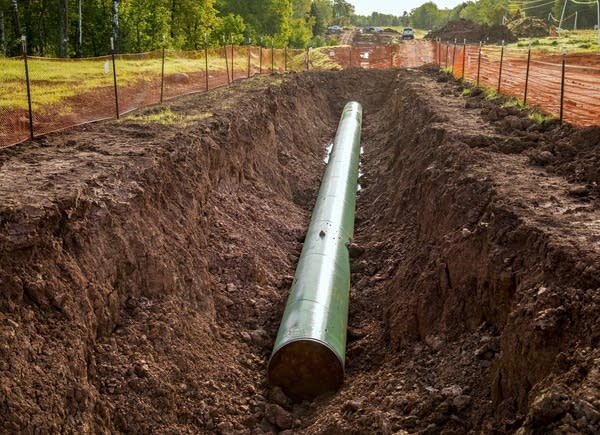Would denial of Line 3 project mean more oil trains?

Enbridge Energy says its customers want more oil, and if a new pipeline doesn't bring it to them, it will get there on trains instead.
"You're not stopping any oil from coming out of the ground. They're putting it on the rails and driving it right next to your elementary schools, right next to your nursing homes, right through small towns all across the state," Minnesota House Speaker Kurt Daudt, R-Crown, said during a speech last month.
To many, that's a scary thought.
But project opponents, including environmentalists, are skeptical.
Create a More Connected Minnesota
MPR News is your trusted resource for the news you need. With your support, MPR News brings accessible, courageous journalism and authentic conversation to everyone - free of paywalls and barriers. Your gift makes a difference.
"There's no evidence to suggest that we would see more trains," said Rep. Frank Hornstein, DFL-Minneapolis, who opposes the Line 3 project.

A few years ago, he and other lawmakers were concerned about the large number of trains carrying North Dakota's Bakken oil through Minnesota.
But oil-by-rail has dropped off significantly since then, and most of what is being produced is moving by pipeline.
Hornstein said some Canadian oil crosses Minnesota, but he said a new pipeline wouldn't necessarily stop that traffic. He says both pipelines and oil trains come with risks to safety and the environment — they're just different.
"What we really should be doing is ensuring that both modes are safe and that we're using a lot less oil that we have to transport through Minnesota communities," he said.
So would the denial of the Line 3 pipeline lead to more oil trains? Analysts who monitor Canadian oil production and transportation agree with Enbridge that it would, but it's complicated.
Kevin Birn of IHS Markit said he's already seeing an uptick in rail movement as Canadian oil producers just keep producing oil.
"You have to think of these more like baseload power plants. To throttle them back actually causes their costs to go up," he said.
Oil that's ready to ship might sit in a tank for a while until it can get on a pipeline or train. How much more oil would move on trains is unclear, but analysts say currently less than 10 percent of the oil coming out of the oil sands moves by rail.
And if more oil moves by rail, that doesn't necessarily mean it will travel through Minnesota. Birn says most of it goes to places outside of the Midwest.
"Most of those crude-by-rail movements out of Canada are heading toward the Gulf Coast. Some movements go to the East Coast and West Coast, some of it goes into the Midwest as well, but smaller volumes," he said.
The price of oil — and the price of moving it — also come into play. Mike Walls, a crude oil analyst with Genscape, said it's a lot more expensive to ship oil on trains.
"If you're moving it from Hardesty, Alberta, to the Chicago refining complex, on rail you're looking at somewhere around $10, on pipe you're looking at $5 to $6 per barrel," he said.
Environmental groups oppose pipelines because they want less oil to be burned. And since the U.S. started allowing oil exports in 2015, John Lipscomb of Riverkeeper, a group that monitors environmental threats to the Hudson River in New York, said those concerned about the burning of fossil fuels know it's not enough for Americans to switch to electric cars.
"If we reduce the price of moving the oil to the coast, where it can be shipped abroad, we are in a sense supporting industry's desire to export oil. And the market now is potentially enormous," he said.
Minnesota's Public Utilities Commission will weigh in with their decision on the Line 3 oil pipeline next week.